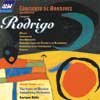Rodrigo Concierto de Aranjuez
Aranjuez with softened edges in a harp arrangement, plus some intriguing rarities
View record and artist detailsRecord and Artist Details
Composer or Director: Joaquín Rodrigo
Genre:
Orchestral
Label: ASV
Magazine Review Date: 7/2003
Media Format: CD or Download
Media Runtime: 66
Mastering:
Stereo
DDD
Catalogue Number: CDDCA1089

Tracks:
| Composition | Artist Credit |
|---|---|
| Concierto de Aranjuez |
Joaquín Rodrigo, Composer
Enrique Bátiz, Conductor Ieuan Jones, Harp Joaquín Rodrigo, Composer Mexico State Symphony Orchestra |
| Miedo |
Joaquín Rodrigo, Composer
Enrique Bátiz, Conductor Joaquín Rodrigo, Composer Mexico State Symphony Orchestra |
| Cançoneta |
Joaquín Rodrigo, Composer
Enrique Bátiz, Conductor Felix Parra Aguilera, Violin Joaquín Rodrigo, Composer Mexico State Symphony Orchestra |
| (2) Berceuses, Movement: Berceuse de Otoño -Lento-[1923] |
Joaquín Rodrigo, Composer
Enrique Bátiz, Conductor Joaquín Rodrigo, Composer Mexico State Symphony Orchestra |
| (2) Berceuses, Movement: Berceuse de Primavera -Allegro ma non troppo-[1928] |
Joaquín Rodrigo, Composer
Enrique Bátiz, Conductor Joaquín Rodrigo, Composer Mexico State Symphony Orchestra |
| Adagio |
Joaquín Rodrigo, Composer
Enrique Bátiz, Conductor Joaquín Rodrigo, Composer Mexico State Symphony Orchestra |
| Homenaje a la Tempranica |
Joaquín Rodrigo, Composer
Enrique Bátiz, Conductor Joaquín Rodrigo, Composer Mexico State Symphony Orchestra |
| Preludio para un Poema a la Alhambra |
Joaquín Rodrigo, Composer
Enrique Bátiz, Conductor Joaquín Rodrigo, Composer Mexico State Symphony Orchestra |
Author: John Duarte
Rodrigo’s adaptation of the Concierto de Aranjuez was made some 20 years after he had written the Concierto serenata for Nicanor Zabaleta (the ‘Segovia of the harp’), with whom his cooperation was essential – the harp is no less idiosyncratic than the guitar. The change of solo instrument inevitably brings about a sea-change in the character of the work, due in this case to the greater sustaining power of the harp. This is evident in the famous Adagio, and the greater physical difficulty of damping notes on the harp, apparent at the opening where the chords are less incisive than with the guitar; here, the hair-raisingly fast tempo exacerbates the problem. In rapid scale passages the notes run together in a ‘friendlier’ way than on the guitar. Overall, this is a more courtly and genteel Aranjuez than we have been accustomed to, but it is one that stands on its own considerable merits. Ieuan Jones plays his part skilfully and with great sensitivity.
Miedo (‘Fear’) and the sombre and minatory Adagio reveal disturbed thoughts that Rodrigo rarely expressed in his music. These and the other works confirm his gift as a melodist, skill as an orchestrator, and ability to create a perceptible atmosphere. The current catalogue shows no other recording of these two works, or of the Dos Berceuses (in their orchestral form), but no alternative version of the others takes primacy over those in this recording. The booklet notes state that ‘The championing of Concierto de Aranjuez by Segovia led to…’. If so, why was he the only great guitarist who never played it, for whatever reason? This bit of nit-picking aside, what we have is another superb and eminently collectable addition to the growing archive of Rodrigo’s orchestral works.
Miedo (‘Fear’) and the sombre and minatory Adagio reveal disturbed thoughts that Rodrigo rarely expressed in his music. These and the other works confirm his gift as a melodist, skill as an orchestrator, and ability to create a perceptible atmosphere. The current catalogue shows no other recording of these two works, or of the Dos Berceuses (in their orchestral form), but no alternative version of the others takes primacy over those in this recording. The booklet notes state that ‘The championing of Concierto de Aranjuez by Segovia led to…’. If so, why was he the only great guitarist who never played it, for whatever reason? This bit of nit-picking aside, what we have is another superb and eminently collectable addition to the growing archive of Rodrigo’s orchestral works.
Discover the world's largest classical music catalogue with Presto Music.

Gramophone Digital Club
- Digital Edition
- Digital Archive
- Reviews Database
- Full website access
From £8.75 / month
Subscribe
Gramophone Full Club
- Print Edition
- Digital Edition
- Digital Archive
- Reviews Database
- Full website access
From £11.00 / month
Subscribe
If you are a library, university or other organisation that would be interested in an institutional subscription to Gramophone please click here for further information.




